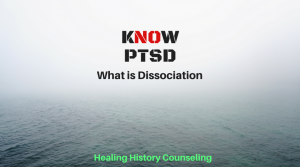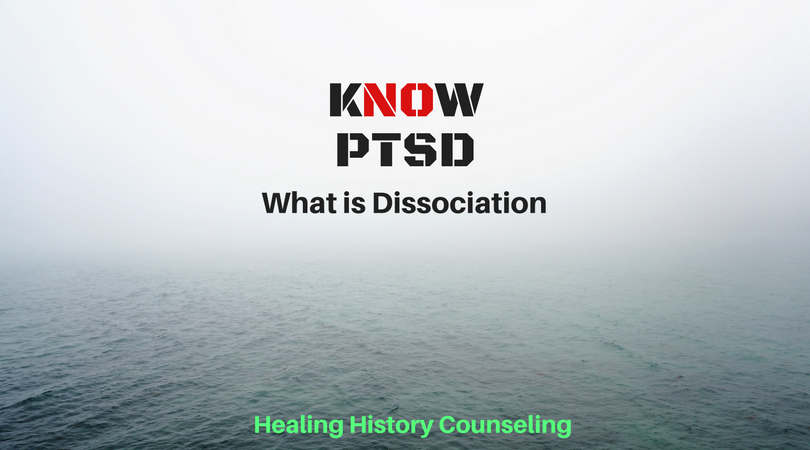


KNOW PTSD: What is dissociation?
Dissociation is when our mind disconnects from an experience of or the feelings connected to an event. Scary memories and intense feelings that our mind feels overwhelmed by can cause us to dissociate. Dissociation can occur at the time of an overwhelming event and it can also happen later when the overwhelming event comes to mind. I find it useful to explain dissociation as happening in two ways: We can disconnect from our memory or we can disconnect from our experience. I know, those two sound similar. Let me take a few moments and explain how they are different.
Dissociating from Our Memory
This aspect of dissociation is all about remembering or not remembering. I find it helpful to cluster this into three categories: Unimportant, Unmanageable and Unforgettable.
- Unimportant: We have probably all experienced driving somewhere and not remembering parts of the drive. Our minds don’t like to waste space remembering stuff that isn’t important. So, things that we do that the mind deems as trivial may not be remembered. This is why we may struggle to remember the boring stuff we did yesterday, and it is why driving a familiar road can go unremembered.
- Unmanageable: Extreme events can overwhelm our ability to cope. In order to still function our mind may take that experience and pack it away to be dealt with later when we have the ability to cope with it. When we pack the event away, we are actually packing away a part of ourselves: that part of ourselves that holds the memories, thoughts and feelings of that event.
- Unforgettable: The other side of not remembering is not being able to stop remembering (it can be helpful to think of this as dissociating from what is happening right now and going into a memory). This is when our memory of an extremely upsetting experience can be re-experienced as if it was happening again. This is referred to as a flashback (check out these blog posts for more information on flashbacks and how to manage them).
Dissociating from Our Experience
This aspect of dissociation is not about forgetting, it’s about separation. Sometimes, in order to not be overwhelmed by an experience, we will remember but create some space between ourselves and the experience. We use a shift in perspective to make the experience manageable. Here are 3 ways we may do this:
- Separation of the self from the experience: This is a stepping back from the experience. People who use this shift in perspective will often explain it as “I was standing in the corner watching it happen” or “I was looking down on it, like I was floating above” or “I see it is me, but it’s like it’s happening to someone else”. This is a perspective shift that moves themselves away from the event.
- Separation of the experience form reality: This creates a feeling like the event, the environment, or even the world isn’t real. Someone who is experiencing this may say: “It feels fake” or “It just seems wrong, like the color or texture of it isn’t right”. This is a perspective shift that moves the event away by making it seem less real.
- Separation of the feelings from the experience: This is when someone has the memory but does not have an emotional response to it. They might say “I know I should be upset but I’m not” or “when I tell others about it, they get really upset and I don’t understand why”. This perspective shift removes the upsetting emotions from the experience.
Dissociation is NOT automatically a bad thing. Our mind uses dissociation to protect us from something it believes we can’t handle. It’s an emergency response to a crisis situation. It is not meant to be a final solution to the crisis, it is only meant to get you through until you obtain the skills you need to deal with the event. Think of dissociation as the tourniquet that saves your life while you rush to the hospital to treat the cause of the bleeding; the tourniquet can actually cause extensive damage if left on permanently. The problem comes when we never go back and deal with the event that lead to the dissociation. Here are several common reasons we avoid healing the experience that caused the dissociation:
- We continue to see the experience the same way we saw it when it occurred – as being too much to handle. We fail to see what has changed since the event. Perhaps the event happened when we were a kid; the process of growing up provides us with many tools that we did not have when younger.
- Our beliefs and feelings about the event. Often, we come to believe things about ourselves (in relation to the event) or about the event that makes us less willing to revisit and heal the experience. If we have come to believe that what happened was our fault or that we are unworthy of happiness we are more likely to avoid healing our past.
- We fail to understand how changes in our environment can make us more capable of dealing with the situation. A battle in a war zone is not just what happened during that battle. The soldier is in a foreign country, in a war and away from many of their strongest supports (family and friends). These factors impact our ability to deal with an experience. As these factors change and improve our ability to deal changes and improves.
- It’s gone badly in the past. Perhaps you’ve revisited the event previously. Perhaps it went badly, even VERY badly. Growing up and getting out of the situation are not guarantees that revisiting the event will be beneficial. Having the right skills, the right help and being prepared are also necessary for successful revisiting of an event that has caused dissociation.
It is possible to treat dissociation and to heal from the events that have caused our need to dissociate. When working to heal from events that trigger dissociation it can be very helpful to work with a therapist that is skilled in treating dissociation. In fact, I would argue that it is vital! When a therapist works with dissociation but fail to treat the dissociation the likelihood of successful healing is greatly diminished. I specialize in helping adults heal from difficult childhoods, childhood trauma, CSA (Childhood Sexual Abuse), PTSD (Post Traumatic Stress Disorder) and cPTSD (complex PTSD). I am skilled in working with dissociation successfully. Contact me to schedule your free 30 minute, in person, consultation to discuss how I can help you with dissociation.
<!–
–>
Leave a Reply